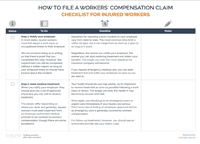Imagine this: a buzzing construction site where workers labor with heavy machinery, steel beams, and large wooden boards. Amidst the bustle, a worker loses their footing on a platform and falls to the ground. The worker brushes off the incident and continues on. A week later, pain and complications arise, leaving the worker unsure of what to do.
In this blog post, we’ll explore the potential consequences of unreported workplace injuries and provide guidance on how to rectify the situation, safeguarding your rights and entitlements.
What is workers’ compensation?
Workers’ compensation is a type of insurance that provides financial benefits to employees injured on the job.
There are two important things to understand about workers’ compensation claims:
- Workers’ compensation is no-fault insurance. You can receive benefits for your work-related injury regardless of who’s at fault for your injury.
- Workers’ compensation is a sole remedy. If you accept workers’ compensation benefits, you waive your right to sue your employer for your workplace injury in almost all situations.
Because workers’ compensation is—in most cases—your sole remedy for a workplace injury, it’s imperative that you follow the steps necessary to qualify for workers’ compensation benefits.
Do I need to notify my employer of my workplace injury?
Most states have laws in place requiring injured workers to notify their employers promptly after suffering a workplace injury to be eligible for workers' compensation benefits. The specific requirements, including the notification time frame and the format of reporting, vary from state to state.
For example, under Tennessee law, an injured worker must report their work-related injury to their employer in writing within 15 days of the date of the injury.
Failing to notify your employer within the specified time frame may prohibit you from receiving any benefits.
Are there exceptions to the worker’s compensation notification requirement?
Most states have exceptions to the workers’ compensation notice requirements, meaning that you may be able to receive workers’ compensation benefits even if you fail to notify your employer within the timeline. Here are some common exceptions:
- Employer knowledge: If the employer already knows about the worker’s injury, either through direct observation or other means, many states waive the notice requirement.
- Medical emergency: In some cases, if the injured worker is unable to provide notice due to a medical emergency or incapacitation (such as a coma), the notice requirement may be waived or extended.
- Gradual injuries or occupational diseases: For injuries or conditions that develop over time, such as repetitive stress injuries or occupational diseases, the notice requirement may be more flexible. For example, workers may be allowed to provide notice once they become aware of the injury and its connection to their employment, as opposed to providing notice soon after the initial injury was sustained.
- Retaliation or intimidation: If an injured worker can prove that they were afraid to report the injury due to fear of retaliation or intimidation from their employer, the notice requirement may be waived.
- Legal incapacity: If the injured worker is legally incapacitated, such as being a minor or having a mental disability, the notice requirement may be waived or relaxed.
Additionally, some states have a catch-all exception that allows the notice requirement to be waived if the injured worker can provide a reasonable excuse for their failure to give notice.
What should I do if I was injured at work but failed to report my injury?
If you realize that you forgot to notify your employer of your workplace injury for purposes of filing a workers' compensation claim, it's essential to take the following steps as soon as possible:
- Notify your employer: Inform your employer about the injury as soon as possible, even if you think you’ve missed the deadline. Provide the information in writing if possible and keep a copy for your records.
- Seek medical attention: If you haven't already done so, see a healthcare professional to assess and treat your injury. Inform the medical provider that the injury is work-related, and make sure to obtain documentation of your diagnosis and treatment plan.
- Review your state's laws: Familiarize yourself with your state's workers' compensation laws, including the specific deadlines for reporting injuries and filing claims. There may be an exception that applies in your case.
- Consult an attorney: Speak with a workers' compensation attorney to discuss your situation and get advice on the best course of action. An experienced attorney can help you navigate the process, determine if any exceptions apply, and assist you in filing a claim if you're still eligible.
- Document everything: Keep detailed records of your injury, medical treatments, communications with your employer, and any expenses incurred due to your injury. This documentation can be essential in supporting your claim.

Download this checklist for injured workers to learn how to file a workers’ comp claim and track your progress.
Download in PDF format


